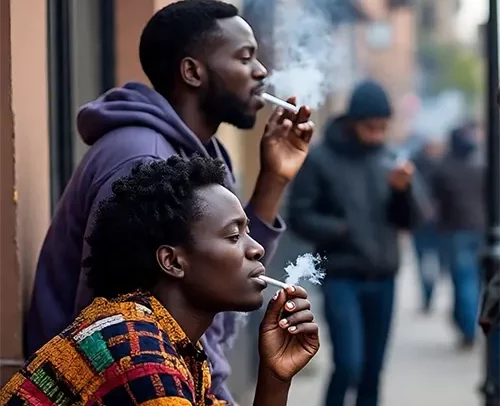WALK AROUND the Central Business District of Accra, and you will meet not less than three people smoking in an open space in broad daylight. When it gets around 6pm, individuals come in their numbers walking unconcerned on major streets, polluting the air like nobody’s business. Dare to comment about their behavior, and you will regret addressing the matter?
Places like the Nima Market Area and Dansoman Glefe Station have become common spots where men can be seen smoking tobacco, shisha or cigarettes in public, exposing those nearby, including children, to second-hand smoking.
This act of public smoking exposes non-smokers, especially vulnerable groups like children, pregnant women, and people with pre-existing health conditions, to serious health problems.
Second-hand smoking is an unconscious or involuntary inhalation of smoke by anyone who finds himself/herself within a circumference of about 10 metres where an active smoker is smoking.
Approximately 1.3 million deaths worldwide are attributed to secondhand smoke exposure annually, 11.2% of the burden of secondhand smoke exposure falls on children under the age of 5, according to ash.org.uk. About 33% of male non-smokers, 35% of female non-smokers, and 40% of children worldwide are exposed to second-hand smoke.
While there are no data on impact on second-hand smokers, Ghana has prohibited smoking in most public places, public transport, and recreational areas to protect non-smokers from secondhand smoke. As stated in the Public Health Act, 2012 (Part VI, Section 58) and the Tobacco Control Regulations, 2016 (L.I. 2247), Ghana prohibits smoking in public places.
This is to protect the public and workers from the harmful effects of second-hand smoke.
Weak enforcement of laws and regulations has however contributed to a growing trend of public smoking, with an increasing number of locals and foreign nationals smoking openly in public spaces.
Head of the Tobacco and Substance Abuse Department of the Food and Drugs Authority (FDA), Mrs Olivia Boateng, said, “Children usually do not smoke but if their parents do that in their presence or they sit around people who smoke, they inhale the same cancer-causing substances as smokers and are even at a higher risk of developing lung cancer.”
The Food and Drugs Authority in December 2025 lamented the raise and disregard for laws prohibiting smoking in places.
Dr. Abigail Arthur who works with the FDA in her own words said, “We’re intensifying surveillance to ensure illegal products do not enter the market,” Dr. Arthur noted, urging facility operators and citizens to support the enforcement of tobacco regulations.
The FDA remains optimistic that restricting smoking to controlled environments and protecting vulnerable groups, such as children and pregnant women, will significantly reduce the health risks associated with smoking in Ghana.
BY Prince Fiifi Yorke


